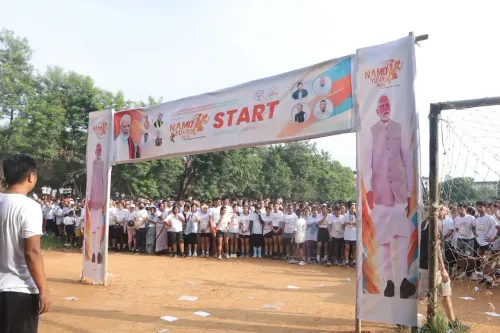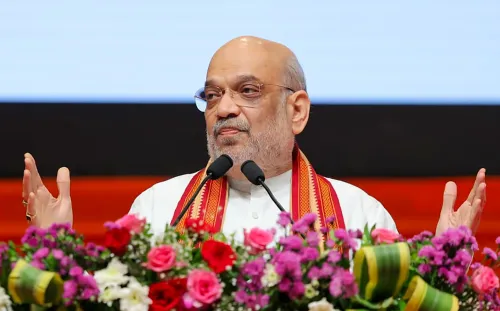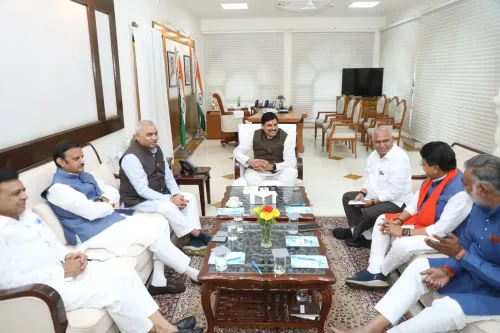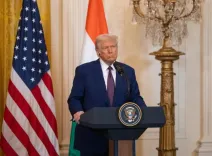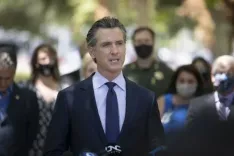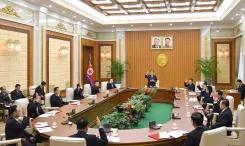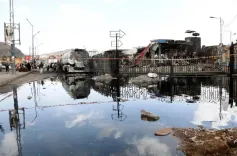Does a united India convey a strong message against terrorism?
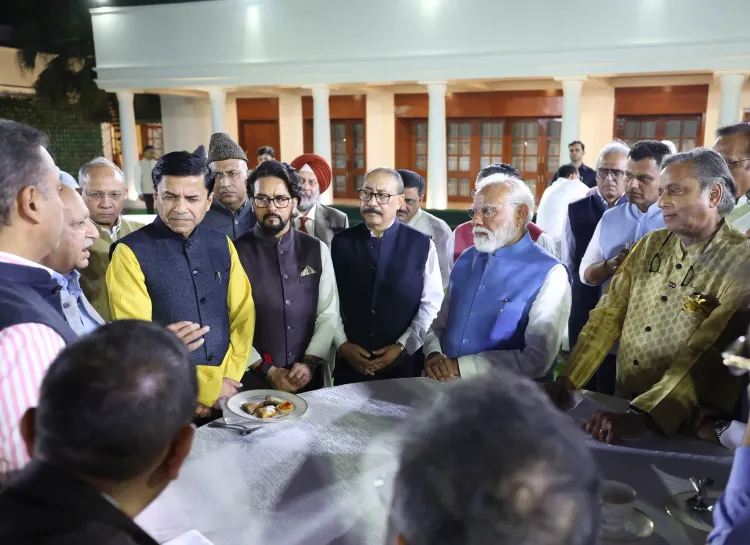
Synopsis
Key Takeaways
- Unified National Messaging: The presence of cross-party delegates illustrated that counter-terrorism transcends political rivalry.
- Exposing Pakistan: The delegations highlighted Pakistan’s involvement in the Pahalgam attack, urging international entities to take corrective measures.
- Diplomatic Isolation: The outreach further isolated Pakistan on the diplomatic stage, underscoring that there can be no distinction between terrorists and their sponsors.
- Community Engagement: Delegations interacted with the Indian diaspora and local communities, strengthening ties and garnering support for India's position.
- Future Diplomacy Blueprint: India should formalize parliamentary diplomacy, create joint task forces on anti-terrorism, maintain diaspora connections, and pursue strategic multilateral coalitions.
New Delhi: In a historic moment for independent India, Members of Parliament from BJP, Congress, AIMIM, DMK, BJD, Shiv Sena, and various other parties came together to convey a strong and unified message. Prominent opposition figures such as Shashi Tharoor, Supriya Sule, Asaduddin Owaisi, and Ghulam Nabi Azad stood alongside BJP leaders like Nishikant Dubey and regional representatives including Kanimozhi, all of whom participated in coordinated visits that received international acclaim, emphasizing a firm stance of zero tolerance towards terrorism.
Following the devastating terrorist attack in Pahalgam on April 22, and India's military response known as Operation Sindoor, the Government of India initiated an extraordinary diplomatic effort. Starting May 23, seven all-party parliamentary delegations, composed of 59 MPs from both the ruling and opposition parties, traveled to approximately 32 countries. Their mission was to engage world leaders, policymakers, media, think-tanks, and diaspora groups.
The representatives aimed to deliver a clear and unified message: India’s unwavering stance against terrorism, along with a warning to terrorist organizations and their backers. This outreach included meetings with all permanent members of the UNSC, strategic partners in the Gulf, Europe, North America, and select nations in Africa, presenting a single, united voice for India.
This initiative was remarkable for the national unity it demonstrated. Amidst a politically divided landscape, leaders from all major parties joined forces to articulate a singular message for India. This rare display of solidarity conveyed a potent message: the struggle against terrorism is a national responsibility that transcends political divides.
Throughout their global engagements, the all-party delegation met with several influential world leaders, significantly enhancing India's anti-terrorism narrative. In Washington DC, discussions were held with US Vice President J D Vance, focusing on counter-terrorism and reinforcing the India-US strategic alliance. In Brussels, BJP MP Ravi Shankar Prasad and his team met with Peter De Roover, President of the Chamber of Deputies of Belgium, who expressed strong support for India. Engaging with political leaders in Bahrain and Kuwait also led to significant conversations, including an informal 'Diwaniyah' gathering where the delegation connected with over 40 prominent Kuwaitis, including former Deputy Prime Ministers and influential editors.
Other groups engaged with Senator Nelsinho Trad in Brazil and interacted with Lord Dominic Johnson and other senior UK parliamentarians. These high-profile meetings, along with discussions in Spain, Malaysia, Liberia, and elsewhere, underscored the extent of India's diplomatic outreach and the broad international support for its firm anti-terror stance.
Interactions with foreign officials reinforced India's commitment to counter-terrorism and regional stability, clearly communicating New Delhi's zero-tolerance policy and the importance of differentiating between dialogue and terrorism. Meetings with Korean dignitaries, including a former Foreign Minister, emphasized the need for accountability for terror sponsors, linking counter-terrorism efforts directly to regional peace.
In Kuwait and Saudi Arabia, delegation leader Baijayant Panda articulated India's desire for peace without third-party intervention. Asaduddin Owaisi highlighted Pakistan's Takfiri ideology, comparable to Al Qaeda and ISIS, and the significant presence of 240 million Indian Muslims. Ghulam Nabi Azad noted the unprecedented protests by Kashmiri people against Pakistan-sponsored terrorism following the Pahalgam attack, while Nishikant Dubey recalled India's concession to Pakistan during the Sharm-el-Sheikh talks in 2009.
These diplomatic efforts resulted in strong expressions of solidarity, with host nations reaffirming their own zero-tolerance policies and reinforcing bilateral cooperation against terrorism. By emphasizing India's measured military response and commitment to peace, the delegations portrayed India as a responsible global player, countering misinformation and fostering a shared understanding of the dangers posed by cross-border terrorism. This outreach not only enhanced India's credibility but also advanced multilateral initiatives against terrorism, promoting regional stability and collective security.
In addition to high-level discussions, delegates participated in press conferences, roundtables, and community receptions, utilizing symbolic gestures such as candle-lighting ceremonies to enhance emotional connections and diplomatic impact. These actions fostered empathy and effectively communicated India's resolve on a human level.
Five key insights emerged from this initiative:
- Unified National Messaging: The presence of cross-party delegates illustrated that counter-terrorism transcends political rivalry.
- Exposing Pakistan: The delegations highlighted Pakistan’s involvement in the Pahalgam attack, urging international entities to take corrective measures.
- Diplomatic Isolation: The outreach further isolated Pakistan on the diplomatic stage, underscoring that there can be no distinction between terrorists and their sponsors.
- Community Engagement: Delegations interacted with the Indian diaspora and local communities, strengthening ties and garnering support for India's position.
- Future Diplomacy Blueprint: India should formalize parliamentary diplomacy, create joint task forces on anti-terrorism, maintain diaspora connections, and pursue strategic multilateral coalitions.
India’s diplomatic initiative comprising seven delegations was unprecedented in both scope and political unity. By uniting diverse ideological perspectives behind a common national cause, India delivered a clear message: the nation stands resolute against terrorism, backed by unity and determination.
This collective representation demonstrated India's readiness to lead, uphold its sovereignty, and cultivate enduring partnerships founded on shared values. The essence lies not merely in the meetings held, but in how India sustains engagement, builds alliances, and institutionalizes unity as its first line of defense. This is not just a reaction to a crisis; it is a moment for India to reclaim its diplomatic agency and speak with a unified voice in a world where unity is paramount.
The delegations achieved more than mere awareness; they forged alliances. Next steps will include follow-up visits to nations with initially muted responses, supplemented by targeted outreach; establishing intelligence and policy working groups, potentially involving UNSC allies, to refine operational cooperation; formalizing parliamentary diplomacy for future crises; and engaging with media and think tanks to maintain narrative clarity and spotlight policy objectives.
As delegation members met with Prime Minister Narendra Modi on Tuesday and shared their feedback, he expressed his satisfaction with their accomplishments and tweeted, "We are all proud of the manner in which they put forward India’s voice."
(Harsh Vardhan Shringla is a former Foreign Secretary of India and Ambassador to the USA, Bangladesh, and Thailand. The views expressed are personal.)

